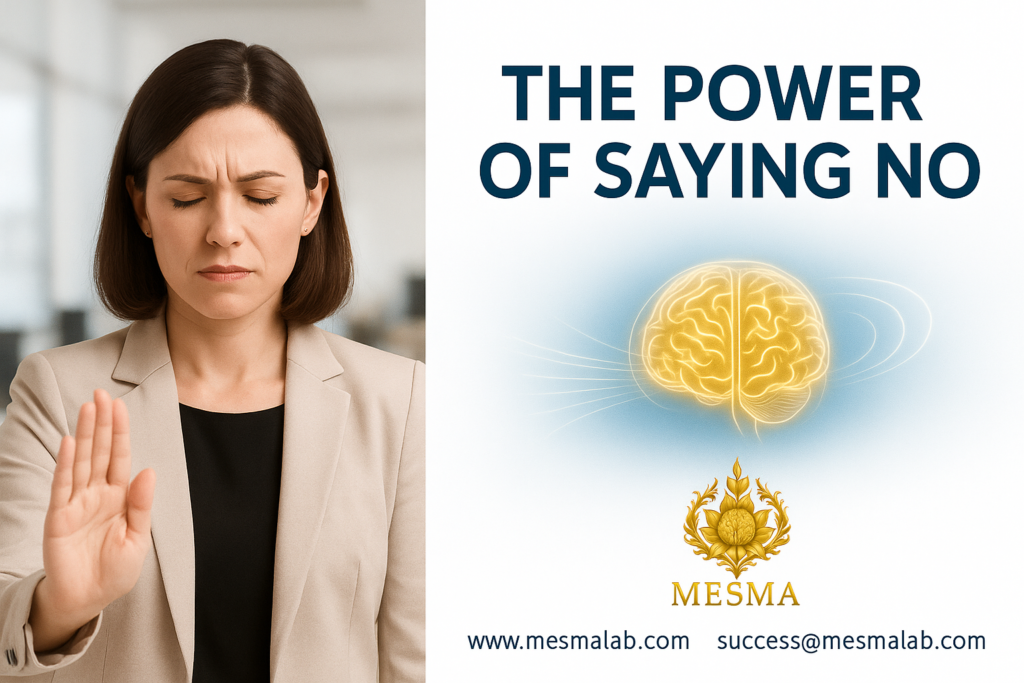“Saying ‘No’ is not rejection. It is redirection — toward balance, health, and self-respect.”
— Sathish Sampath, Founder, MESMA Lab
In a world that rewards availability, overcommitment, and self-sacrifice, saying “No” often feels like a betrayal — especially for women juggling multiple roles at work and home.
But here’s the truth:
Every “yes” you say to others without boundaries is a potential “no” to your own well-being.
For women in the workplace, especially those balancing family, caregiving, leadership, or societal expectations, the struggle to set healthy boundaries is not just a productivity issue — it’s a mental health issue.
📊 The Hidden Cost of Always Saying “Yes”
According to a 2023 Harvard Business Review survey:
- 64% of women professionals say they struggle to set boundaries with colleagues.
- 1 in 2 working mothers reported guilt when declining extra tasks at work.
- Women are twice as likely to experience emotional exhaustion from “people-pleasing” roles.
🤯 What Happens in the Brain When You Can’t Say No?
Neuroscience tells us that boundary violation isn’t just emotional — it’s neurological.
| Brain Area | Effect When Boundaries Are Weak |
|---|---|
| Amygdala | Overactivation → stress, anxiety, fear of rejection |
| Insula | Heightened guilt and emotional sensitivity |
| Prefrontal Cortex (PFC) | Weakened decision clarity and assertion |
| Default Mode Network (DMN) | Overthinking, people-pleasing, rumination |
The act of saying “No” activates the same fear circuits in the brain as social rejection. But with mindful training, these circuits can be rewired.
🧠 Boundary Setting is a Mental Fitness Skill
At MESMA, we view “Saying No” not as a negative behavior but as a brain-body regulation skill.
When you say No with presence, you:
- Activate your vagal tone (calming your system)
- Strengthen the ACC (focus and emotional self-control)
- Reduce chronic cortisol release from saying yes under pressure
✋🏻 Why It’s Especially Hard for Women
Women are often raised to be:
- Pleasers (“Don’t upset others.”)
- Peacemakers (“Keep the harmony.”)
- Performers (“Do it all and look good doing it.”)
This leads to:
- Fear of disappointing people
- Difficulty articulating personal limits
- Burnout masked as responsibility
🌿 MESMA’s 4-Step “No with Grace” Framework™
Our Mindful Assertion Training helps professionals — especially women — reclaim space, time, and energy through mindful refusal.
| Step | Practice | Outcome |
|---|---|---|
| 1. Pause | Take 3 breaths before responding | Reduces automatic guilt response |
| 2. Feel | Notice where in the body you’re feeling pressure | Reconnects with intuition and boundaries |
| 3. Phrase | Use pre-rehearsed phrases with confidence | Creates clarity without confrontation |
| 4. Reflect | Journal how it felt to say no | Reinforces neural growth in boundary setting |
🔊 Scripts to Say “No” Without the Guilt
- “I appreciate you thinking of me, but I won’t be able to commit right now.”
- “I’m prioritizing rest and balance, so I’ll have to decline.”
- “That sounds exciting, but I’m protecting my current bandwidth.”
- “Let me check my schedule and get back to you.” (Gives time to respond mindfully)
🧘 MESMA Mind Practices to Support Boundary Strength
✅ 1. The “No Breath”
- Inhale: “I choose clarity.”
- Exhale: “I release guilt.”
Do this before any high-pressure interaction. It calms the nervous system and anchors assertiveness.
✅ 2. Mirror Practice
- Look into the mirror and say:
“I honor my needs. I do not need to justify my boundaries.”
This rewires the brain for internal validation.
✅ 3. The Guilt Journal
- Write down:
- A moment you felt guilty for saying no
- What value you were protecting
- How you’ll reframe guilt as growth
This activates prefrontal clarity over emotional reactivity.
👩💼 Real Voices from MESMA Community
“I used to say yes to every late meeting — even if I was exhausted. Now I check in with myself before I commit.”
— Anjali S., Software Engineer
“Boundaries used to feel selfish. Now they feel sacred.”
— Pooja R., HR Consultant
“I feared disappointing others. But I was disappointing myself daily. MESMA taught me to shift that.”
— Lakshmi T., Legal Advisor & Mom
🌍 Culture Shift: Why “No” is a Form of Empowerment
At MESMA, we teach that “No” is not a wall — it’s a window.
When you say no to:
- Overload
- Toxic obligations
- Unfair expectations
You say yes to:
- Focus
- Joy
- Purpose
- Energy
- Self-respect
And that “yes” changes everything.
🔑 Takeaway
Saying “No” is not about conflict — it’s about clarity.
It is a skill that can be learned, practiced, and embodied.
Through MESMA’s breath-mind-body approach, women professionals can:
- Break the guilt cycle
- Set firm yet graceful boundaries
- Redefine strength not as sacrifice, but as self-honoring
Because the most powerful thing you can say today might just be a gentle, grounded:
“No, thank you.”
🌐 Explore More
Website: www.mesmalab.com
Email: success@mesmalab.com
Stay tuned for:
- MESMA’s Mindful Assertion Audio Series™
- Boundaries Workbook
- Mindset Rewiring Journal Prompts


